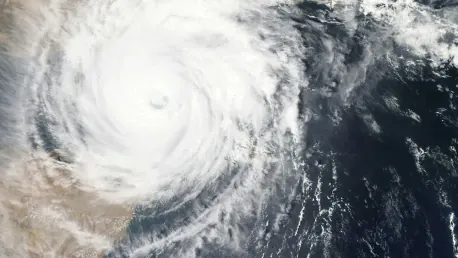As Hurricane Helene hurtles towards the southeastern United States, urgency is mounting to ensure that residents are adequately prepared for its severe impact. Hurricane Helene, currently positioned approximately 500 miles south-southwest of Saint Marks, FL, is projecting a path towards the Florida Big Bend, the eastern Florida panhandle, southeastern Alabama, and southwestern Georgia. The National Weather Service has issued multiple Storm Surge and Hurricane Warnings for these areas, emphasizing catastrophic potential outcomes. The intensifying storm, with wind speeds now at 85 mph and expected to increase, warns of powerful winds, life-threatening storm surges, and extensive flash flooding. Given these severe conditions, immediate action and preparedness are indispensable to minimize potential damage and safeguard lives.
The affected residents are urged to take evacuation advisories seriously and act swiftly to secure essential items and seek safe shelter. The storm’s rapid forward speed suggests its destructive path will extend far inland, causing widespread inaccessibility due to debris. Catastrophic wind damage is anticipated, including the flattening of structures, uprooting of trees, and prolonged power outages. Storm surges are predicted to add to the peril by causing extreme beach erosion, severe property damage, and making escape routes impassable. Additionally, the significant rainfall accompanying Hurricane Helene is expected to lead to flash flooding and riverine overflow, particularly in areas already saturated from prior rainfall. The immediate threat is compounded by the heightened risk of tornadoes, which complicates emergency response plans and heightens the urgency for effective community preparedness.
Public safety agencies and weather experts underscore the importance of staying informed through official channels. Resources such as ready.gov and real-time updates from the National Weather Service provide invaluable, timely information and actionable safety advice. Ensuring that all community members are consistently updated with accurate information is crucial for effective preparedness and response. Given the severity of Hurricane Helene, taking heed of official recommendations and preparing adequately can be life-saving measures.
The Role of Biomass in Georgia’s Energy Landscape
While communities brace for the immediate challenges posed by Hurricane Helene, Georgia is witnessing a transformative shift within its energy sector. The Georgia Public Service Commission’s recent approval of biomass contracts signifies a significant step towards sustainable energy solutions. Biomass energy, generated predominantly from wood residuals, offers a promising avenue for diversifying the state’s energy mix. Although biomass can be costlier akin to premium gasoline, it presents substantial benefits by utilizing wood residuals from forestry activities, thus minimizing waste and harnessing renewable resources.
Georgia, a leading player in the forestry sector, stands to gain significantly from these sustainable practices. Ensuring that valuable timber byproducts are not wasted but instead contribute to power generation exemplifies Georgia’s commitment to environmental stewardship. Furthermore, biomass energy opens new markets for timber residuals, presenting an advantage for rural economic development. Local entrepreneurs benefit from job creation and economic stability, resulting in a positive feedback loop that supports the livelihoods of those within the forestry industry.
Biomass energy underscores the state’s dedication to sustainable practices while promoting economic benefits in rural areas. Georgia’s push towards biomass is part of a broader commitment to sustainability and energy independence and integrating biomass alongside renewable sources like solar and nuclear energy. By fostering these initiatives, Georgia aims to establish a resilient and reliable energy framework poised for long-term benefits. Addressing both economic and environmental aspects, the emphasis on sustainability creates a positive feedback loop beneficial for all stakeholders. This combination of immediate economic benefits with future resilience and ecological preservation exemplifies Georgia’s pioneering role in sustainable development.
Personal Commentary and Local Updates
As Hurricane Helene barrels towards the southeastern United States, it is crucial for residents to prepare for its severe impact. The storm is now about 500 miles south-southwest of Saint Marks, FL, heading towards the Florida Big Bend, the eastern Florida panhandle, southeastern Alabama, and southwestern Georgia. The National Weather Service has issued multiple Storm Surge and Hurricane Warnings for these areas, highlighting the potentially catastrophic outcomes. With wind speeds of 85 mph and rising, the storm threatens powerful winds, life-threatening storm surges, and extensive flash flooding. Therefore, immediate preparations are essential to minimize damage and protect lives.
Residents in the path of the storm should heed evacuation advisories, secure essential items, and seek safe shelter promptly. The hurricane’s rapid movement means its destruction will reach far inland, making roads impassable due to debris and causing widespread inaccessibility. Severe wind damage is expected, including flattened structures, uprooted trees, and prolonged power outages. Storm surges may exacerbate the situation, causing extreme beach erosion and severe property damage, and blocking escape routes. Significant rainfall is also expected, leading to flash flooding and river overflows, particularly in areas already wet from previous rains. The risk of tornadoes further complicates emergency response plans and adds urgency to preparedness efforts.
Public safety agencies and meteorologists stress the importance of staying informed through official channels. Websites like ready.gov and real-time updates from the National Weather Service provide valuable, timely information and actionable safety advice. Ensuring all residents receive accurate information is crucial for effective preparedness and response. Given the storm’s severity, adhering to official recommendations and preparing adequately are essential life-saving measures.









